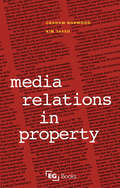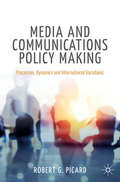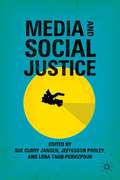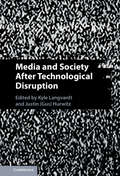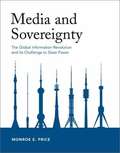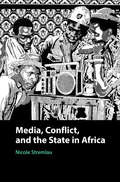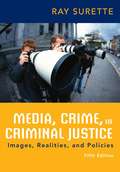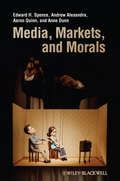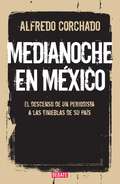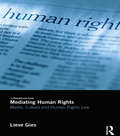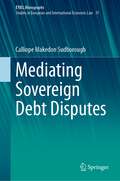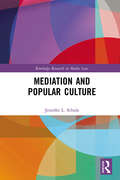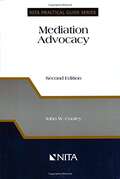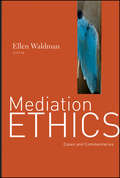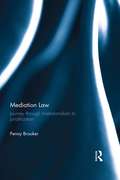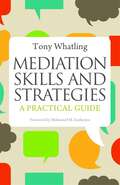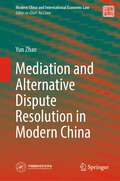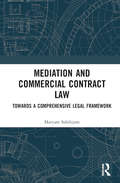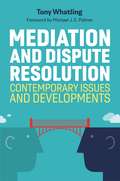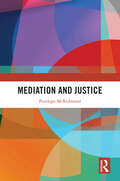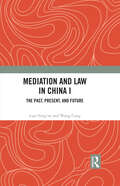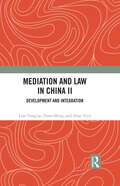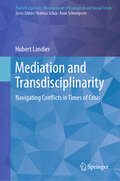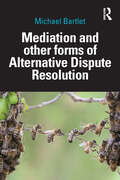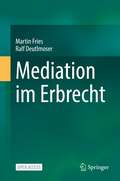- Table View
- List View
Media Relations in Property
by Kim Tasso Graham NorwoodMedia relations are a vital tool for helping property companies build shareholder value through stronger brands, develop reputations that drive a flow of new work, and help sell and let properties faster and at a fraction of the cost of other marketing techniques, but such relationships need to be managed properly. This practical and comprehensive book – peppered with real case studies and observations from numerous people within the property industry – aims to demystify ‘the black art of PR’. Some of the topics covered include: the strategic aims and benefits of good media relations promoting good media relations practice throughout your organization an overview of property opportunities across the UK media understanding journalists and what they want do's and don'ts of working with the media developing a media relations plan the costs of media relations programmes. Written by an award winning property journalist and a marketing consultant with more than forty years experience between them, this book is a must read for all property professionals looking to make the most out of the media.
Media and Communications Policy Making: Processes, Dynamics and International Variations (Palgrave Global Media Policy and Business)
by Robert G. PicardThis textbook focuses on how media and communications policy is made and what influences its design. It explores the structures and processes in which policymaking takes place worldwide, the factors that determine its forms, influence its elements, and affect its outcomes. It explores how to analyze policy proposals, evaluate policy, and use policy studies approaches to examine policy and policymaking. Truly international in scope, it lays out the variety of political, social, economic, and institutional influences on policy, the roles of industries and policy advocates in the processes, and issues and factors that complicate effective policymaking and skew policy outcomes. This textbook is a valuable resource for advanced undergraduate and postgraduate students.
Media and Social Justice
by Sue Curry JansenThis book is an anthology of work by critical media scholars, media makers, and activists who are committed to advancing social justice. Topics addressed include but are not limited to international media activist projects such as the Right to Communication movement and its corollaries; the importance of listening and enacting policies that advance democratic media; regional and local media justice projects; explorations of the challenges the era of participatory media pose to public media; youth and minority media projects and activism; ethical dilemmas posed by attempts to democratize access to media tools; the continued marginalization of feminist perspectives in international policy venues; software freedom and intellectual property rights; video activism in both historical and contemporary contexts; internet strategies for defending dissenting voices; and five accounts by prominent scholar/activists of their lifelong struggles for media justice.
Media and Society After Technological Disruption
by Kyle Langvardt Gus HurwitzThe internet has reshaped the media landscape and the social institutions built upon it. Competition from online media sources has decimated local journalism and diminished the twentieth century's established journalistic gatekeepers. Social media puts individual users front and center in the creation of the content that they consume. Harmful speech can spread further and faster, and the institutions responsible for policing that speech-Facebook, TikTok, YouTube and the like-lack any clear twentieth-century analog. The law is still working to catch up to the world these changes have wrought. This volume gathers sixteen scholars in law, media, technology, and history to consider these changes. Chapters explore the breakdown of trust in the media, changes in the law of defamation and privacy, challenges of online content moderation, and financial viability for journalistic enterprises in the internet age. This title is also available as Open Access on Cambridge Core.
Media and Sovereignty: The Global Information Revolution and Its Challenge to State Power
by Monroe E. PriceHonorable Mention for the 2002 Communication Policy Research Award presented by The Donald McGannon Communication Research Center. Media have been central to government efforts to reinforce sovereignty and define national identity, but globalization is fundamentally altering media practices, institutions, and content. More than the activities of large conglomerates, globalization entails competition among states as well as private entities to dominate the world's consciousness. Changes in formal and informal rules, in addition to technological innovation, affect the growth and survival or decline of governments. In Media and Sovereignty, Monroe Price focuses on emerging foreign policies that govern media in a world where war has information as well as military fronts. Price asks how the state, in the face of institutional and technological change, controls the forms of information reaching its citizens. He also provides a framework for analyzing the techniques used by states to influence populations in other states. Price draws on an international array of examples of regulation of media for political ends, including "self-regulation," media regulation in conflict zones, the control of harmful and illegal content, and the use of foreign aid to alter media in target societies.
Media, Conflict, and the State in Africa
by Nicole StremlauCountries emerging from violent conflict face difficult challenges about what the role of media should be in political transitions, particularly when attempting to build a new state and balance a difficult legacy. Media, Conflict, and the State in Africa discusses how ideas, institutions and interests have shaped media systems in some of Africa's most complex state and nation-building projects. This timely book comes at a turbulent moment in global politics as waves of populist protests gain traction, and concerns continue to grow about fake news, social media echo chambers, and the increasing role of both traditional and new media in waging wars or influencing elections. Focusing on comparative cases from a historical perspective and the choices and ideas that informed the approaches of some of Africa's leaders, including guerrilla commanders Yoweri Museveni of Uganda and Meles Zenawi of Ethiopia, Nicole Stremlau offers a unique political insight into the development of contemporary media systems in Africa.
Media, Crime, and Criminal Justice (5th Edition)
by Ray Surette<i>Media, Crime, and Criminal Justice</i> is the definitive text on media and criminal justice. The book features impeccable scholarship, a direct and approachable style, and an engaging format--supported by visual examples and sidebar material that complements the narrative. With the ever-increasing role of media in both reporting crime and shaping it into infotainment, the importance of the interplay between contemporary media and the criminal justice system is greater today than ever before. Author Ray Surette comprehensively surveys this interplay and showcases its impact, emphasizing that people use media-provided knowledge to construct a picture of the world and then act based on this constructed reality.
Media, Markets, and Morals
by Edward H. Spence Anne Dunn Andrew Alexandra Aaron QuinnMedia, Markets, and Morals provides an original ethical framework designed specifically for evaluating ethical issues in the media, including new media. The authors apply their account of the moral role of the media, in their dual capacity as information providers for the public good and as businesses run for profit, to specific morally problematic practices and question how ethical behavior can be promoted within the industry. Brings together experts in the fields of media studies and media ethics, information ethics, and professional ethics Offers an original ethical framework designed specifically for evaluating ethical issues in the media, including new media Builds upon and further develops an innovative theoretical model for examining and evaluating media corruption and methods of media anti-corruption previously developed by authors Spence and Quinn Discloses and clarifies the inherent ethical nature of information and its communication to which the media as providers of information are necessarily committed
Medianoche en México: El descenso de un periodista a las tinieblas de un país en guerra
by Alfredo CorchadoUn periodista sigue la pista de diversos cárteles de la droga en México, hasta que su propia vida es puesta en predicamento. Es medianoche en México, 2007. Alfredo Corchado recibe una llamada telefónica de su fuente principal para informarle que hay un plan para asesinarlo por parte de un poderoso capo. Pronto averigua que lo quieren matar porque uno de sus artículos en el Dallas Morning News afectó los sobornos que los narcotraficantes entregan a policías, militares y funcionarios del gobierno mexicano. Así comienza el viaje en espiral de un hombre que busca descifrar la compleja situación del país mientras lucha por salvar su vida. A pesar de recorrer un camino de múltiples encrucijadas, desigualdad y violencia extrema, Corchado, "infectado con la enfermedad incurable del periodismo", no se resigna a abandonar la esperanza en tiempos turbulentos. Ahora, el líder del brutal cártel que lo perseguía, el Z-40, está detenido, pero la historia no haterminado de escribirse. "Este libro habla sobre las sangrientas fronteras que dividen los dos países de Alfredo Corchado -México y Estados Unidos- y que han regido su propia vida. Con el telón de fondo de la terrible y violenta guerra contra las drogas que ha convertido a México en una tierra de sepulcros, Corchado comparte su propia historia y la de su familia de manera conmovedora, honesta y aguda." -JON LEE ANDERSON, autor de Che Guevara, una vida revolucionaria "Un sutil y conmovedor testimonio que servirá a cualquiera que desee entender a México desde sus profundidades y cómo es afectado -legal e ilegalmente- por Estados Unidos." -JOHN WOMACK JR., autor de Rebelión en Chiapas "Alfredo Corchado es el tipo de reportero y escritor que nos hace recuperar la fe en el periodismo." -TRACY KIDDER, Premio Pulitzer, autor de La fuerza de lo que queda
Mediating Human Rights: Media, Culture and Human Rights Law
by Lieve GiesDrawing on social-legal, cultural and media theory, this book is one of the first to examine the media politics of human rights. It examines how the media construct the story of human rights, investigating what lies behind the apparent media hostility to human rights and what has become of the original ambition to establish a human rights culture. The human rights regime has been high on the political agenda ever since the Human Rights Act 1998 was enacted. Often maligned in sections of the press, the legislation has entered popular folklore as shorthand for an overbearing government, an overzealous judiciary and exploitative claimants. This book examines a range of significant factors in the mediation of human rights, including: Euroscepticism, the war on terror, the digital reordering of the media landscape, , press concerns about an emerging privacy law and civil liberties. Mediating Human Rights is a timely exploration of the relationship between law, politics and media. It will be of immense interest to those studying and researching across Law, Media Studies, Human Rights, and Politics.
Mediating Sovereign Debt Disputes (European Yearbook of International Economic Law #35)
by Calliope Makedon SudboroughThis book provides a fresh perspective on resolving sovereign debt disputes within the investor-state mediation framework. In response to the limitations of traditional approaches to adjudicating public debt issues and the resulting gaps in international law concerning sovereign defaults, creditors have increasingly turned to investor-state treaty arbitrations to recover unpaid debts. However, this shift has raised numerous criticisms and concerns.Accordingly, this book explores the uncharted territory of utilizing mediation as a means to settle sovereign debt claims. It sheds light on the distinctive characteristics of mediation as a process, setting it apart from judicial litigation and private arbitration, and emphasizing the unique outcomes it can generate. The central argument of this book is that mediation should be seriously considered as a viable option for resolving sovereign debt disputes. Not only does it offer a more cost-effective and expeditious approach, but it also has the potential to facilitate economic recovery and sustain continued investment.
Mediation & Popular Culture (Routledge Research in Media Law)
by Jennifer L. SchulzThis book examines mediation topics such as impartiality, self-determination and fair outcomes through popular culture lenses. Popular television shows and award-winning films are used as illustrative examples to illuminate under-represented mediation topics such as feelings and expert intuition, conflicts of interest and repeat business, and deception and caucusing. The author also employs research from Australia, Belgium, Canada, China, Denmark, France, Germany, Greece, India, Israel, Japan, the Netherlands, New Zealand, Singapore, South Africa, Spain, the United Kingdom and the United States of America to demonstrate that real and reel mediation may have more in common than we think. How mediation is imagined in popular culture, compared to how professors teach it and how mediators practise it, provides important affective, ethical, legal, personal and pedagogical insights relevant for mediators, lawyers, professors and students, and may even help develop mediator identity.
Mediation Advocacy (Nita Practical Guide Ser.)
by John W. CooleyWritten by a lawyer for lawyers, Mediation Advocacy was critically acclaimed in 1996 for its in-depth examination of the mediation process. Now, six years later, the mediation field has changed dramatically, and John W. Cooley updates this classic text to include a comprehensive chapter on cybermediation as well as new sections on various mediation design processes and techniques. In Mediation Advocacy, Second Edition, Cooley leads you step by step through the stages of mediation.
Mediation Ethics
by Ellen WaldmanMediation Ethics is a groundbreaking text that offers conflict resolution professionals a much-needed resource for traversing the often disorienting landscape of ethical decision making. Edited by mediation expert Ellen Waldman, the book is filled with illustrative case studies and authoritative commentaries by mediation specialists that offer insight for handling ethical challenges with clarity and deliberateness.Waldman begins with an introductory discussion on mediation's underlying values, its regulatory codes, and emerging models of practice. Subsequent chapters treat ethical dilemmas known to vex even the most experienced practitioner: power imbalance, conflicts of interest, confidentiality, attorney misconduct, cross-cultural conflict, and more. In each chapter, Waldman analyzes the competing values at stake and introduces a challenging case, which is followed by commentaries by leading mediation scholars who discuss how they would handle the case and why. Waldman concludes each chapter with a synthesis that interprets the commentators' points of agreement and explains how different operating premises lead to different visions of what an ethical mediator should do in a given case setting. Evaluative, facilitative, narrative, and transformative mediators are all represented. Together, the commentaries showcase the vast diversity that characterizes the field today and reveal the link between mediator philosophy, method, and process of ethical deliberation. Commentaries by Harold Abramson Phyllis Bernard John Bickerman Melissa Brodrick Dorothy J. Della Noce Dan Dozier Bill Eddy Susan Nauss Exon Gregory Firestone Dwight Golann Art Hinshaw Jeremy Lack Carol B. Liebman Lela P. Love Julie Macfarlane Carrie Menkel-Meadow Bruce E. Meyerson Michael Moffitt Forrest S. Mosten Jacqueline Nolan-Haley Bruce Pardy Charles Pou Mary Radford R. Wayne Thorpe John Winslade Roger Wolf Susan M. Yates
Mediation Law: Journey through Institutionalism to Juridification
by Penny BrookerIn England mediation became a key part of the civil justice reform agenda after the Woolf Reforms of 1996, as disputants were deflected from litigation towards settlement outside the court system. The Civil Procedure Rules (CPR) give courts the power to ‘encourage’ mediation through judicial case management or use stronger measures by using costs to penalise parties who act unreasonably by refusing to use ADR or mediation. One of the effects of this institutionalisation is an emerging case law that defines how mediation is practiced as it is merges with the litigation process. When mediation first began to be used in England the parties either agreed to mediate by a contract before a dispute happened or decided to attempt the process as a way of resolving disagreements. Inevitably, some disputants either refused to abide by their contractual obligations or would not follow through with the settlement agreements reached through the process. This brought the authority of the law into a new area and the juridification process began. This book explores how mediation law shapes the practice of mediation in the English jurisdiction. It provides a comprehensive examination of the legal framework for mediation, and explores the jurisprudence in order to analyse the extent that institutionalisation by the state and courts has led to the monopolisation by lawyers and a further ‘juridification’ process results. The book includes a comparative legal methodology on the framework underpinning mediation practise in other common law jurisdictions, including the United States, Australia, and Hong Kong, in order to explicate shared or distinctive approaches to mediation. The book will be of great interest to academics and students of legal theory and dispute resolution.
Mediation Skills and Strategies: A Practical Guide
by Tony WhatlingMediation is a process that can be used to resolve conflict in many different dispute contexts. This book focuses on the essential skills and strategies needed by any mediator to be successful in their work. Tony Whatling draws on his extensive experience in the field of mediation to explain the range of skills and strategies that are commonly used, as well as why you would use different skills and when they are best employed. The author shows how, by adopting these techniques, a mediator can manage challenging conflicts. It features the use of questioning skills and how they can be used effectively, as well as how to deal with high emotion and negative responses. This book is essential for anyone who wants to improve their mediation skills, whether as a trainee, novice or experienced professional.
Mediation and Alternative Dispute Resolution in Modern China (Modern China and International Economic Law)
by Yun ZhaoThe book examines the development and application of mediation in China (including Hong Kong). As a popular mechanism for dispute resolution in Chinese history, mediation is believed to be an important process for realizing the official goal of social harmony. Following an overview of the current situation in mainland China and Hong Kong, the book looks into specific legal issues in the application of mediation and the practical use of mediation in specific lines of businesses. The book can serve as an important reference book on the law and practice of mediation in mainland China and Hong Kong for scholars, practitioners, as well as students of mediation and alternative dispute resolution.
Mediation and Commercial Contract Law: Towards a Comprehensive Legal Framework
by Maryam SalehijamThere is an urgent need to better understand the legal issues pertaining to alternative dispute resolution (ADR), particularly in relation to mediation clauses. Despite the promotion of mediation by dispute resolution providers, policy makers, and judges, use of mediation remains low. In particular, problems arise when parties lack certainty regarding the legal effect of a mediation clause, and the potential uncertainty regarding the binding nature of agreements to pursue mediation is problematic and threatens the growth of ADR. This book closely examines the importance and complexity of mediation clauses in commercial contracts to remedy this persistent uncertainty. Using comparative law methods and detailed empirical research, it explores the creation of a comprehensive framework for the mediation clause. Providing valuable insight into the process of ADR and mediation, this book will be of interest to academics, law makers, law students, in-house council, lawyers, as well as parties interesting in drafting enforceable mediation clauses.
Mediation and Dispute Resolution: Contemporary Issues and Developments
by Tony WhatlingMediation and Dispute Resolution addresses contemporary challenges and new developments in mediation. It aims to provide you with the key tools needed as an ADR practitioner to develop your own style and practice.The book examines the impact of diversity and cultural difference in mediation, gender difference and its implications, and the process of managing high conflict. It also explores new areas of practice such as apology and reconciliation and conjoint mediation and therapy. With advice on how to manage the move into mediation from a previous professional career, the conflicts between practitioners' personal lives and their work are also discussed.Throughout, the book focusses on practical strategies and skills, using case examples in each chapter to highlight the application of theory. An invaluable resource for both experienced and novice mediators to build, consolidate and improve their practice, this book is a perfect complement to Whatling's introductory guide Mediation Skills and Strategies.
Mediation and Justice
by Penelope McRedmondThis book asks why justice is important to both individuals and to society as a whole. A number of justice questions are raised to evaluate whether mediation can deliver social, distributive, procedural, or substantive justice and fairness.Focussing on a scrutiny of mediation in the context of justice, the book covers social justice and justice issues posed by confidentiality, bias, lack of fairness, and Online Dispute Resolution. Discussing whether mediation can truly deliver justice to all, this book identifies areas where this fails and provides solutions and suggestions for improvement.. The dangers of private justice, bias, mandatory mediation, and the side lining of the importance of fairness in the resolution of disputes are all considered. In contrast, the positive aspects of mediation are added to the balance.This book will be of interest to researchers in the field of conflict resolution, law, and social science. Readers will also be found among mediators and people interested in justice and the civil justice system.
Mediation and Law in China I: The Past, Present, and Future
by Liao Yong’an Wang CongAs the first volume of a two-volume set on mediation in China, this book examines the legal foundations of Chinese mediation and feasible paths to the institutionalization and professionalization of mediation.Grounded in traditional dispute resolution practices throughout Chinese history, mediation is born out of the Chinese legal tradition and considered to be “Eastern” in nature. The first volume discusses the legal principles that underpin mediation in China, rooted in a legal tradition that pursues the rule of law and morality as well as the concept of harmony in Chinese society. It first revisits traditional notions and models of Chinese mediation and then puts forward approaches to innovating the concept, institutionalization, and mechanism of mediation. The book also discusses how to promote professionalization and special legislation dedicated to mediation in China, thus establishing a mediation system that fits into and is properly tailored for Chinese society. It introduces diverse styles of mediation and social governance in different cultural contexts and demonstrates the effectiveness of China's experience in dealing with a litigious society.This title will serve as a crucial reference for scholars, students and related professionals interested in alternative dispute resolution, civil litigation, and especially China’s dispute resolution policy, law, and practice.
Mediation and Law in China II: Development and Integration
by Liao Yong’an Duan Ming Zhao YiyuAs the second volume of a two-volume set on mediation in China, this book examines the development of a diversified dispute resolution regime and other major types of mediation in China.Grounded in traditional dispute resolution practices throughout Chinese history, mediation is born out of the Chinese legal tradition and considered to be “Eastern” in nature. This second volume focuses on eight types of mediation prevalent in China in terms of its formation, development, challenges and achievements: people's mediation, court mediation, administrative mediation, industry mediation, commercial mediation, lawyer mediation, online mediation, and a combination of arbitration and mediation. In analyzing these diversified forms of mediation, the authors explain the necessity of integrating emerging forms of mediation with historical ties and traditional practice and thereby reshape a mediation system that incorporates diversified approaches, changing contexts and various dimensions including history and reality, theory and practice, state and society.This title will serve as a crucial reference for scholars, students and related professionals interested in alternative dispute resolution, civil litigation, and especially China’s dispute resolution policy, law, and practice.
Mediation and Transdisciplinarity: Navigating Conflicts in Times of Crisis (Transdisciplinary Management of Ecological and Social Crises)
by Hubert LandierThe world is in crisis at every level: the planet, humanity, and all kinds of human communities, including working communities. The result is likely to be violence and chaos. And yet, man lives and can only live with others. Relationships in all their forms therefore need to be developed with a view to building a common future. However, when this in-between has been broken, when it is no longer possible to get along, when violence threatens or develops in a sometimes dramatic way, it may be necessary for both sides to call on an external third party. This book is based on decades of professional experience in the practice of corporate mediation. It examines the crucial role of mediators in resolving conflicts and fostering understanding in various contexts. By exploring real-life case studies and theoretical frameworks, the book offers valuable insights into how mediation can be a powerful tool for creating a harmonious and sustainable future.
Mediation and other forms of Alternative Dispute Resolution
by Michael BartletCovering both the principles and practice of Alternative Dispute Resolution (ADR), this important new textbook equips students not only with a contextual understanding of the role of ADR in adjudicating civil disputes but also with the different forms of mediation and ADR available and the key issues in their application.Providing theoretical and practical insights, the book begins with a critical examination of the tenets on which ADR is based, where it sits in relation to civil law, and how it is applied in different national contexts. It discusses the various areas in which mediation or arbitration can be applied, from family mediation to restorative justice, and includes chapters on the ethics of mediation and its psychology, as well as an introduction to online dispute resolution (ODR). The concluding chapter offers some thoughts on the benefits and challenges of mediation.Featuring a glossary of key terms, detailed case law, end-of-chapter problem questions, and advice around listening skills during a mediation process, Mediation and other forms of Alternative Dispute Resolution is an essential textbook for any student approaching ADR for the first time and offers practitioners an opportunity to reflect on the context of ADR.
Mediation im Erbrecht
by Martin Fries Ralf DeutlmoserDieses Open-Access Buch erläutert in einer praxisnahen Darstellung, wie sich Erbstreitigkeiten durch eine Mediation zügig und für alle Beteiligten sehr befriedigend beilegen lassen. Auf der Grundlage ihrer jahrelangen Mediationspraxis berichten die Verfasser, warum sich erbrechtliche Konflikte in besonderer Weise für pragmatische Kompromisse eignen und wie es gelingt, die Erben auf diesen Weg zu bringen. Das Buch versteht sich als Ratgeber für anwaltliche Berater, Mediatoren sowie für Erblasser und Erben und gibt vielfältige Hilfestellungen für kluges Konfliktmanagement in der Gestaltung und Abwicklung der Vermögensnachfolge.
